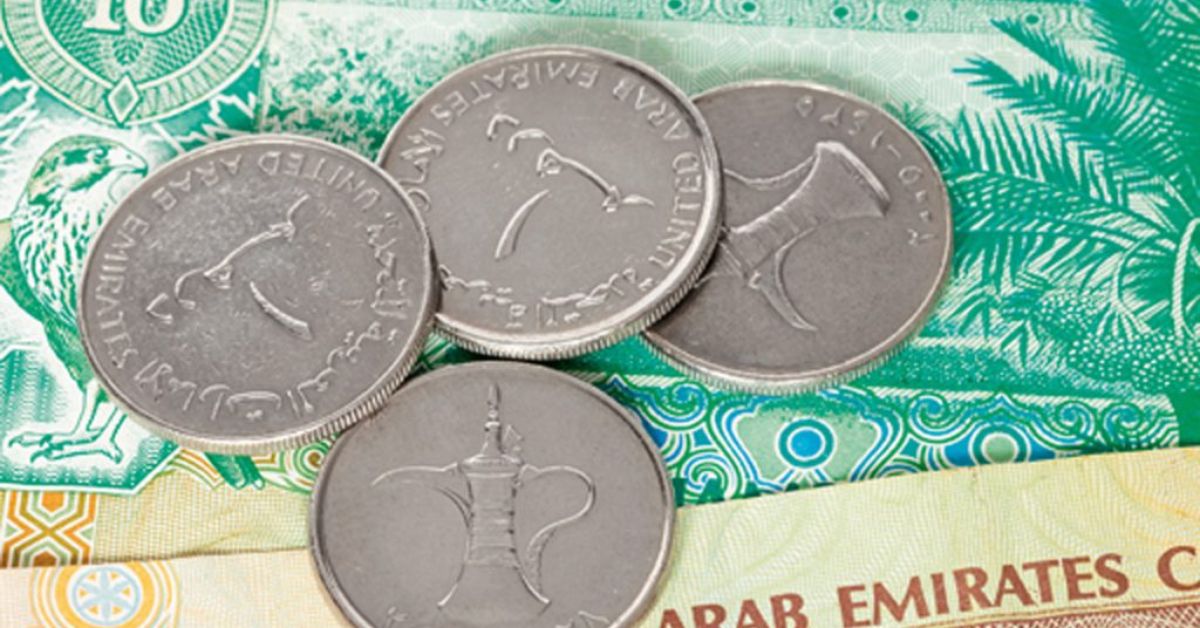Money might not be the first thing you think about when planning a trip to Dubai, but knowing how it works can make your journey much easier. The city runs on the UAE Dirham (AED), a stable and widely accepted currency that keeps travel transactions simple and secure. From street markets to five-star hotels, cash and card payments blend seamlessly here.
Still, understanding Dubai’s money culture, where to exchange your cash, and how tipping works can help you avoid confusion and feel more at home. Whether you’re buying souvenirs in Deira or dining in Downtown, this guide walks you through everything about spending, saving, and showing appreciation in Dubai.

Understanding Currency in Dubai
The official currency in Dubai is the United Arab Emirates Dirham (abbreviated AED).
Here are some quick facts:
- Subunits: The official currency of Dubai is the United Arab Emirates Dirham (AED), often written as “Dh” or “Dhs.” The dirham is divided into 100 smaller units called fils
- Coins & banknotes: Common banknotes include AED 5, 10, 20, 50, 100, 200, 500, and 1,000. Coins are things like AED 1, 25 fils, 50 fils.
- Exchange rate: AED is fixed (pegged) to the US dollar. USD $1 is about AED 3.6725.
You’ll find that credit and debit cards work almost everywhere, hotels, restaurants, malls. But carrying some cash (dirhams) is wise, especially for small shops, street vendors, taxis, small tips.
When changing money, use reputable exchange houses or banks. Avoid sketchy ones. Also check the current exchange rate before you travel so you know roughly what to expect.
Read this guide to be ready visiting the city and enjoy every bit of it. Essential Safety Tips for Tourists in Dubai
Where and How to Exchange Money in Dubai
You’ll have no trouble finding currency exchange centers in Dubai. From airports to malls and main streets, they are located almost everywhere. However, the rates vary, and it’s smart to compare a few before exchanging large sums.
Some of the most trusted and licensed exchange houses include:
- Al Ansari Exchange
- Al Rostamani International Exchange
- UAE Exchange
- Lulu Exchange
- Sharaf Exchange
You can also exchange money at banks, though exchange houses usually offer slightly better rates. Most centers display the latest Dubai currency rate on digital boards, so you can easily check before you hand over your cash.
A Few Tips for Exchanging Money
- Avoid changing too much at the airport. Airport exchange counters are convenient but often have higher margins.
- Keep your receipts. You may need them when converting leftover dirhams back into your home currency before leaving.
- Use official centers only. Avoid random or street money changers for safety and better rates.
- Know the rate. It’s a good idea to check the daily AED rate online before you travel.
Using ATMs and Cards in Dubai
Dubai is a cash-friendly yet highly digital city. ATMs are easily available at airports, malls, metro stations, and hotels. They dispense only dirhams, and most accept international cards such as Visa, MasterCard, and American Express.
Things to Know Before Using Your Card
- Inform your bank before traveling so your card isn’t blocked for security reasons.
- Watch for foreign transaction fees. Some banks charge 2–3% extra on international purchases.
- Withdraw larger amounts at once to avoid repeated ATM fees.
- Check exchange rates your bank uses for withdrawals.
If you prefer digital payments, Apple Pay, Google Pay, and Samsung Pay are accepted in most modern establishments. Whether you’re paying for dinner, a spa session, or your hotel stay, contactless payments are safe, quick, and widely used.
That said, always carry some cash in dirhams, especially small notes like AED 5, 10, 20, and 50. You’ll need them for taxis, street snacks, or tips.
Service Charges in Dubai
In Dubai, you might notice that some restaurants or hotels automatically add a service charge to your bill, usually around 10%. This isn’t a government tax, it’s usually distributed among staff. If a service charge is already included, you don’t need to tip extra unless you truly want to.
In hotels and high-end restaurants, you may also see small tourism or municipality fees added to your bill. These are standard across the UAE and are nothing to worry about.
Tip: Always check your bill before tipping. If a 10% service charge is already included, tipping again is entirely optional.
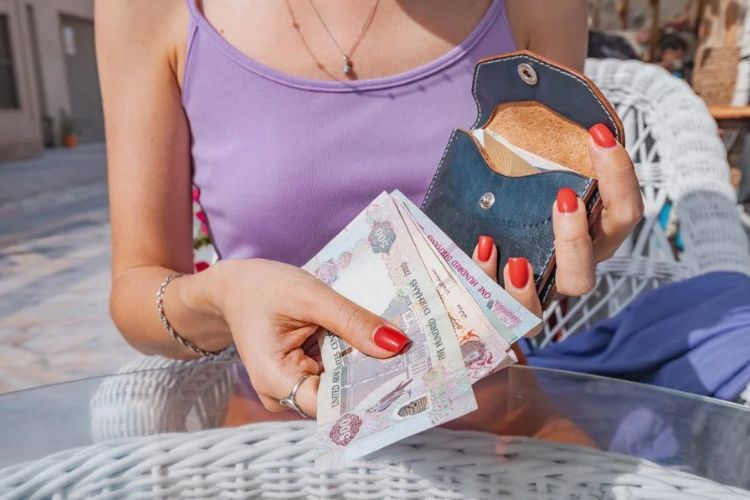
Tipping: What’s Customary in Dubai
Tipping in Dubai is not required by law, but it’s a lovely way to show appreciation when someone provides good service. People here don’t expect tips, yet a small amount can make a person’s day. Think of it as a simple gesture of gratitude rather than an obligation. Whether you’re dining out, taking a taxi, or staying at a hotel, here’s what’s generally practiced across the city.
Restaurants and Cafés
When dining out in Dubai, tipping depends on whether a service charge is already added to your bill. If it isn’t, leaving 10–15% is a nice way to thank the staff. At casual cafés, coffee shops, or takeaway counters, you can simply round up the bill or drop a few dirhams into the tip jar. While it’s not mandatory, your generosity will always be appreciated by the servers.
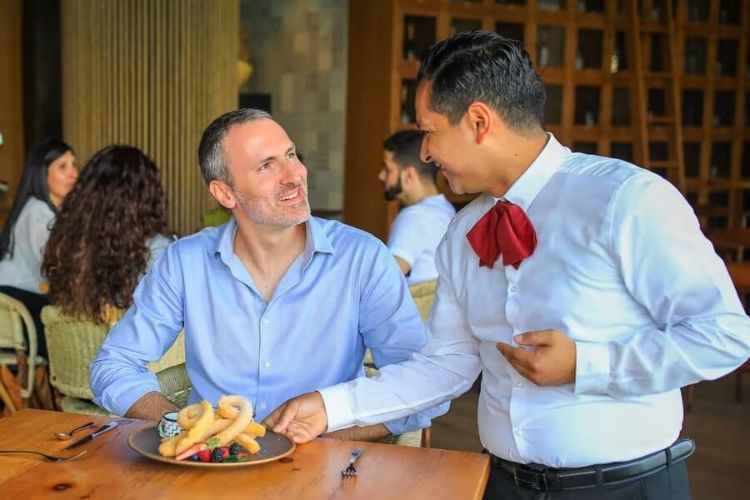
Hotels
In Dubai’s hotels, tipping is seen as a kind way to reward attentive service. Bellboys usually receive AED 5–10 per bag, and housekeeping around AED 10–20 per night for keeping your room clean and tidy. If the concierge goes above and beyond, such as arranging reservations or transport, a small tip of AED 20–30 shows genuine appreciation. Hotel staff work hard to ensure guests are comfortable, so a little gesture goes a long way.
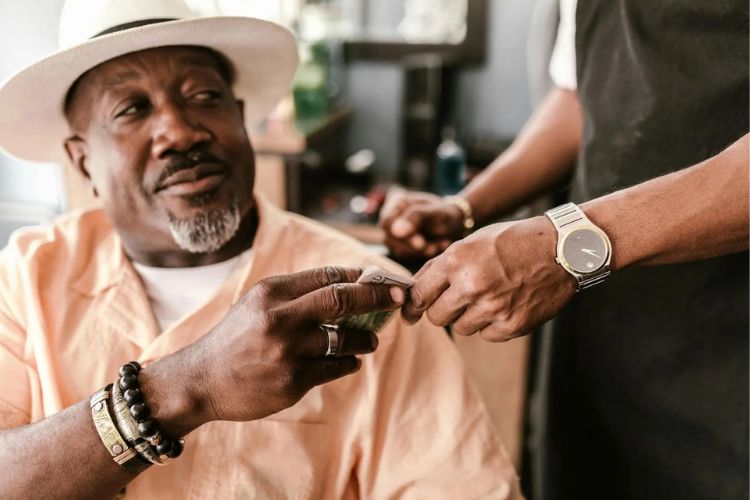
Taxis and Ride Apps
Taxi drivers in Dubai don’t expect a tip, but rounding up your fare or adding AED 5–10 is a nice way to say thanks. The same applies when using ride apps like Careem or Uber, where you can add a digital tip directly through the app. Drivers here are usually polite, helpful, and professional, and even a small extra amount is a thoughtful way to acknowledge their service, especially on longer trips.
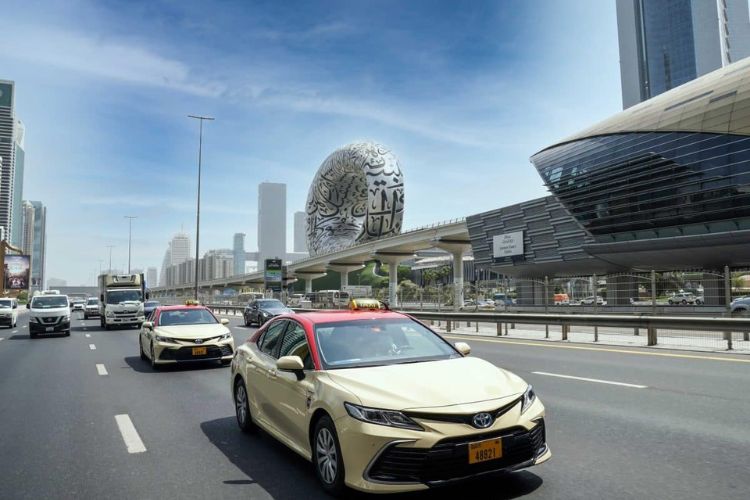
Spas and Salons
After a relaxing massage, haircut, or beauty treatment, it’s polite to leave a 10–15% tip if you’re satisfied with the service. Many spa and salon staff rely on tips as part of their income, so even a modest amount can make a difference. You can hand the tip directly to the person who served you, or leave it at the counter in an envelope. Always give in cash (AED) unless tipping options are built into the bill.

Tour Guides and Drivers
If you’ve booked a tour, tipping your guide or driver is a great way to thank them for their time and effort. A typical range is AED 20–50 per person for guides, and AED 10–20 for drivers. For private tours or longer excursions, you can give a bit more if the experience was memorable. Many guides work long hours in the heat, sharing local stories and making sure your trip goes smoothly, so your tip is truly valued.
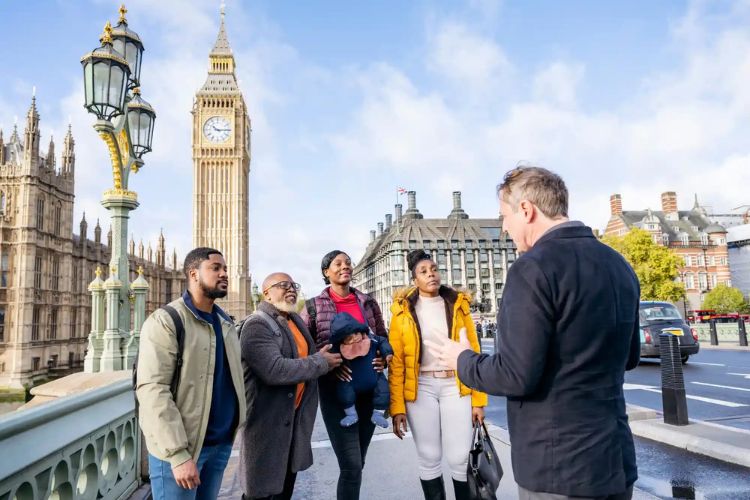
Where Your Dirhams Go: Typical Daily Expenses in Dubai
It helps to have an idea of how much things cost in Dubai so you can plan your budget. Here’s a quick guide to average prices:
| Item | Average Cost (in AED) |
| Coffee at a café | 15–25 |
| Lunch at a casual restaurant | 40–80 |
| Dinner at a fine-dining restaurant | 150–400 |
| Taxi ride across town | 25–60 |
| Metro ride (one way) | 3–8 |
| Bottle of water | 2–5 |
| Souvenir magnet | 10–20 |
Of course, prices vary depending on the area, luxury districts like Downtown Dubai or Palm Jumeirah tend to be pricier, while old neighborhoods like Bur Dubai or Deira are budget-friendly.
How Dubai’s Currency System Reflects Its Culture
Dubai’s money system says a lot about its character, modern yet respectful of tradition. The dirham has Arabic and English inscriptions, showing how the city bridges East and West. The fixed exchange rate gives tourists confidence, while the balance of cash and digital payments reflects Dubai’s innovation.
Even tipping habits show the city’s blend of cultures, a mix of Arab hospitality, Western customs, and Asian courtesy. There’s no strict rulebook, just kindness and gratitude in action.
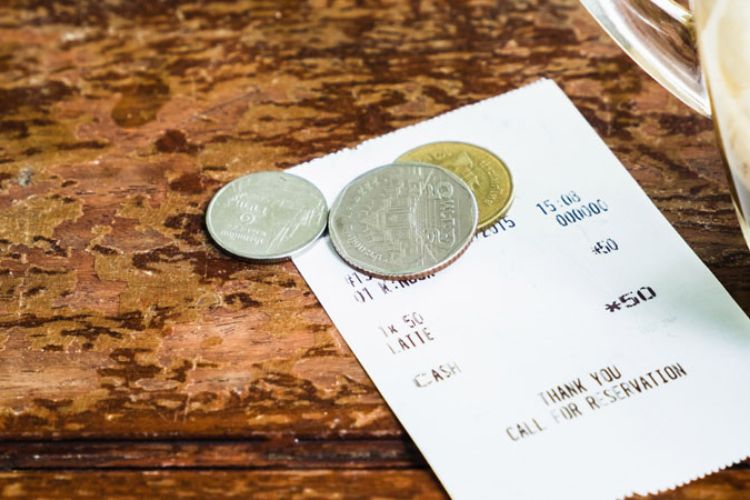
Exchanging Leftover Dirhams
Before leaving Dubai, if you have extra cash, you can:
- Convert it back to your home currency at any exchange house.
- Keep it for next time. Many travelers revisit Dubai, and AED never expires.
- Use it for last-minute shopping at duty-free outlets at Dubai International Airport.
If you plan to convert, do it before security check, as rates inside the terminal can be slightly higher.
Safety and Security with Money in Dubai
Dubai is one of the safest cities in the world, and that extends to financial transactions. Theft and scams are rare, but it’s still smart to stay alert:
- Always count your cash in front of the teller.
- Keep large amounts in your hotel safe.
- Use ATMs located in malls or banks.
- Don’t share card details over public Wi-Fi.
Final Words: Spend Smart, Tip Kindly
Money can seem confusing when you’re in a new country, but Dubai keeps things simple. The UAE currency is strong and steady, the exchange system is transparent, and tipping customs are relaxed but appreciated.
As a traveler, your comfort grows when you understand how money moves, from paying for a desert safari to tipping your waiter for that perfect Arabic coffee. Being aware of local habits shows respect and opens doors to warm smiles.
So, when you plan your next trip, remember to carry a little cash, know the currency basics, and tip kindly. That’s not just good manners, it’s part of the Dubai spirit that makes every visitor feel welcome.
FAQs About Currency and Tipping in Dubai
What is the official currency used in Dubai?
The official currency in Dubai is the United Arab Emirates Dirham (AED), often written as “Dhs” or “Dh.” One dirham equals 100 fils. It’s a stable currency linked to the US dollar at around AED 3.67 = USD 1. You’ll use dirhams for almost all payments across the city.
Where can I exchange my money in Dubai?
You can exchange money at banks, airports, and licensed money exchange houses such as Al Ansari, UAE Exchange, or Lulu Exchange.
Can I use my debit or credit card in Dubai?
Yes, card payment in Dubai is widely accepted. Most hotels, restaurants, shops, and even taxis take Visa, MasterCard, and contactless payments like Apple Pay or Google Pay.
How much should I tip in Dubai?
Tipping isn’t mandatory but it’s appreciated. In restaurants, 10–15% is common if no service charge is added. For hotel staff, AED 5–10 per bag and AED 10 per night for housekeeping are standard. Taxi drivers often receive AED 5–10 extra, and tour guides around AED 20–50 per person.
Can I use US dollars, euros, or pounds in Dubai?
Most shops and restaurants accept dirhams only. Some luxury hotels and duty-free outlets may take US dollars or euros, but change will be given in AED and rates may vary. It’s best to pay in local currency for accurate value and smoother transactions.

